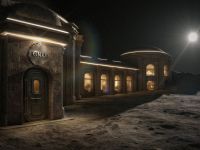By Nigel Thorpe
A small group of skilled Jordanian craftsmen in Fountain Square disproved the common belief that Jordan has very few natural resources. Using natural local materials such as olive wood, colored sand, goat’s wool and local stone, and depending on Bedouin heritage, desert and mountain scenery as the inspiration for their designs, the local craftsmen proved they can create a wide range of high-quality crafts.
The sand artist Nour Tan Tawi showed Albawaba how skilled workmanship can transform a simple pile of sand into a beautiful work of art. Using only a funnel, metal rod, syringe and scoop made from the bottom of a plastic water bottle, Nour sifts, shakes and injects layers of colored sand into glass bottles. Deft movements of the needle transform a small pile of brown sand at the bottom of a tall glass bottle into an elegant camel. Sweeps of the needle turn the yellow and white sand poured in above the camel into desert valleys and sand dunes. In less than five minutes, the brightly colored Eastern bottle (Sharki), the tourists favorite, is ready for sale. Tasteful desert moonscapes in black and white are also popular. Most of the sand colors are natural and 25 kilograms of sand cost Nour one dinar. For a small extra fee, Nour will “sand write” your name inside the bottles that cost, according to their size and complexity of design, from one to ten dinars. “Business during the Festival has been quite good,” commented Omar, It took Nour three years to learn the art of sand painting and he has now been practicing his craft for five years. Nour’s son has followed his father into the successful craft business. Their workshop is in Burma, near Jerash.
Amongst the ruined columns behind Nour, the craft material changes from sand to wood. Ahmad Mifleh Hassan Al-Sharman carves beautiful models of Petra, the Dome of the Rock, and nativity scenes out of the hard amber wood of the olive tree. The cost of the carved pieces ranges from one to twenty-five dinars. “I have been in the woodcarving business for seven years now, and I have trained most of my family to help me in my factory in Mazar near Karak. We export our work to the United States, Europe and the Gulf. We like to make things that reflect our Jordanian heritage, Palestinian traditions, and our rich local heritage of holy sites.” Albawaba photographed Ahmad holding one of his wooden ships which sell for 15 dinars and takes a full day to make. A forest of Rabbabahs, the traditional Jordanian stringed instrument, stand in front of Ahmad’s laden table.
Across the crowded square, another wood craftsman, Kifah Ka’adan, displays hair clips carved from beautifully colored wood that costs between 270 and 2,500 dinars per square meter. Kifah has perfected his wood turning techniques over the past twenty-eight years at his workshop in Irbid. Despite his handicap he produces large hubbly-bubbly
(shishah) pipes and wooden vases. Kifah presented both Her Royal Highness Princess Basma, and Her Majesty Queen Noor Al Hussein, with Giant wooden vases worth thousands of dinars which now stand in the royal palace. “A few years ago, I gave his late Majesty King Hussein (May His Soul Rest in Peace), one of my pieces that he admired. Business has been bad,” said a saddened Kifah.
Kifah’s neighbors in the square sell cushions, carpets and place mats made by members of the Jerash Ladies Association. “We get all our goats’ wool from the shepherds, and the Jerash ladies make the traditional Jordanian designs. The vibrant red, black and green colors in the carpets are mostly natural colors. The finished dyed wool products range in price form 5 to 60 dinars. Again, the stallholders lamented the poor business for them at the festival so far.
A review of the Jerash 2000 artistic sights in the Colonnade would not be complete without mention of the strange spheres of light that bob around in the darkness in children’s hands like luminous UFO’s. Close up, the spheres prove to be of terrestrial, and not extraterrestrial origins. Imported from Dubai, the luminous footballs available in red, yellow, and white were being bought up eager children for one dinar a piece.
Sand bottles, wooden ships, wood carvings and wool carpets, are just a few of the large range of local crafts available in the Fountain Square, at this year’s festival. At least from the visitor’s point of view, it was certainly a highly successful experiment adding a new dimension to the traditional drama, dancing, music and song of the main Festival events.
© 2000 Al Bawaba (www.albawaba.com)







